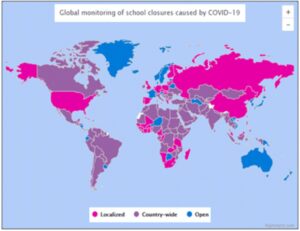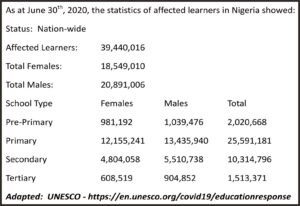By Samuel Ekong (Ph.D.)
Introduction
The insightful words of Malcolm X at the Organization of Afro-American Unity (O.A.A.U.) founding forum at the Audubon Ballroom on June 28, 1964 appear to be more relevant in today’s world than ever. He asserted that “education is an important element in the struggle for human rights. It is the means to help our children and our people rediscover their identity, and thereby increase their self-respect. Education is our passport to the future, for tomorrow belongs only to the people who prepare for it today” Allah, S. (2013). The concluding part of the foregoing quote – ‘…education is our passport to the future…’ is the driving force for penning these few thoughts of mine.
Currently, the world is under the spell of corona virus pandemic, tagged COVID-19 (Corona Virus Infectious Disease – 2019), which started in late 2019 in Wuhan, Hubei Province, China. Unlike other 21st century waves of fatal illnesses, such as Severe Acute Respiratory Syndrome (SARS) in 2002, Middle East Respiratory Syndrome (MERS) in 2012 and Ebola Virus Disease (EVD) in 2014; the World Health Organization (WHO) declared the outbreak of COVID-19 a pandemic on March 11, 2020. The significance of the declaration is that COVID-19 has spread worldwide, with enormous devastation on health, business, and economy (UNESCO & WHO, 2020). There has been massive job losses, many businesses have gone under already, many seeking various forms of bailout, and yet many more businesses filing for bankruptcy.
At this juncture, one begins to muse whether there is any credence to what a novelist – Margaret Atwood prognosticated about a world devastated by a virus in her 2009 fiction novel of pandemic titled ‘The Year of the Flood’ (Ciabattari, J. 2020). Indeed, the COVID-19 pandemic represents a collective global struggle against a common, but invisible enemy.
To abate the spread of the virus, various lockdown measures have been put in place across the globe. A ‘Stay at Home’ order enforced, except for emergency services, including medicals and food supplies. Schools across the globe were equally shut down.
One silver lining to this pandemic is that families have experienced a once in a lifetime bonding as both parents and children are ‘locked down’ together at home. Children now appreciate better the nature of their parents’ work, while parents on the other hand participate more actively in their children’s school work (Ekong, 2020).
My interest is in the assessment of availability and/or effectiveness of learning to children in the public primary and secondary schools in general, and in the rural communities in Nigeria, in particular. This curiosity is underpinned by well-established predisposing factors plaguing the Nigerian education system, particularly in the rural communities, such as – high levels of poverty, lack of access to a good quality education, dearth of requisite school infrastructure, lack of funding, rural-urban divide as well as lack of training for teachers in the rural communities (Ekong, 2016). Don’t get me wrong!! I am a product of that system.
Global Perspective of Learning during Lockdown
 A report by UNESCO in mid-April indicated that 192 countries had closed all schools and universities, affecting more than 90 percent of the world’s learners: approximately, 1.6 billion children and young people around the world. Besides, nearly 369 million children who rely on school meals needed to look to other sources for daily nutrition. (UNESCO, 2020). Consequently, all schools and faculties have been forced to move on from the normal face-to-face method of learning to a new way of learning – virtual or online.
A report by UNESCO in mid-April indicated that 192 countries had closed all schools and universities, affecting more than 90 percent of the world’s learners: approximately, 1.6 billion children and young people around the world. Besides, nearly 369 million children who rely on school meals needed to look to other sources for daily nutrition. (UNESCO, 2020). Consequently, all schools and faculties have been forced to move on from the normal face-to-face method of learning to a new way of learning – virtual or online.
It is interesting to note that the availability, accessibility and effectiveness of online education is unevenly spread across the globe. Education systems and the resultant learning outcomes are confronted with horrific challenges, such as access, quality, equity, and inclusion, among other factors. In developed regions of the world, educators tend to more easily adapt and use extensive internet facilities with remarkable speed. Information technology (IT) tools powered by advanced artificial intelligence like Skype, WhatsApp, Microsoft Teams, Zoom and Google classroom are commonly in use to teach various subjects as well as to create a platform of interaction between the teachers and the students/learners. The teachers have therefore adopted a discipline to design new learning environments that guarantee sufficient level of flexibility, adaptability and suitability for different users at the same time. Softic, S. (2020).
Learning during Lockdown in Nigeria
 A further analysis of UNESCO’s global monitoring of school closures caused by COVID-19 indicates some staggering statistics of affected learners in Nigeria. As at June 30th 2020, a total of 39 million children have been shut out of school. One is unable to confirm whether this number includes the Almajiri children (migrant children in search of Islamic knowledge), mostly in the Northern part of Nigeria. Please note that the 39 million is in addition to the already 10.2 million out-of-school children as announced by the then Minister of Education, Malam Adamu Adamu in 2019 (NAN, 2019). Therefore, we are looking at about 50 million Nigerian children (approximately a quarter of Nigeria’s population of 206 million) being out of school for at least four months now, and still counting (UN Data, 2020).
A further analysis of UNESCO’s global monitoring of school closures caused by COVID-19 indicates some staggering statistics of affected learners in Nigeria. As at June 30th 2020, a total of 39 million children have been shut out of school. One is unable to confirm whether this number includes the Almajiri children (migrant children in search of Islamic knowledge), mostly in the Northern part of Nigeria. Please note that the 39 million is in addition to the already 10.2 million out-of-school children as announced by the then Minister of Education, Malam Adamu Adamu in 2019 (NAN, 2019). Therefore, we are looking at about 50 million Nigerian children (approximately a quarter of Nigeria’s population of 206 million) being out of school for at least four months now, and still counting (UN Data, 2020).
An understanding of rural-urban population mix in Nigeria will provide a deeper insight into the lost opportunities to equip Nigeria’s children with learning that can guarantee them a future. According to United Nations Data, 49% of Nigerian population live in the rural communities. With this is mind, let’s consider the various forms of learning during this lockdown.
Learning in the Urban Areas
In the cities, very few elitist private schools with good IT infrastructure have partnered with parents to provide learning to pupils/students through various learning tools, mainly WhatsApp, email, school websites and recorded videos to keep their children on the learning track; and these parents are more likely to spend extended hours to support their kids with school work. Interestingly, other average private schools in urban areas are not able to afford adequate IT infrastructure, therefore struggle immensely with poor connectivity, making learning much more frustrating, and almost impossible.
Still in the urban areas, many other lower level private schools are unable to engage their pupils/students in any form of learning. A survey carried out by PREMIUM TIMES revealed that a good number of private schools are unable to provide any form of learning to their pupils, primarily because they are struggling to keep their staff engaged due to inability to pay salaries. A school proprietress was quoted as saying “Most parents are owing second term fees, we had to source for funds and struggle to pay the salaries for March. We have been unable to pay for April as we speak and right now we are looking at May salaries too.” She continued that “the lockdown was too sudden, not allowing private school owners any time to collect outstanding debts and the second term fees from which they could have paid their teachers and other workers.” (Adedigba, A. 2020). Many of such teachers have resorted to making a direct arrangements with parents, to provide private lessons to children at their homes, even at the risk of COVID-19 pandemic.
The availability and effectiveness of learning in public schools during this lockdown was confirmed through telephone conversations with some teachers, parents and students of public primary and secondary schools in Rivers and Akwa Ibom states. Indeed, the outcome of those conversations indicated a complete different learning experience. They practically relied on the educational programs promised by government to be aired on radio and television. Many parents who are unable to generate their power are at the mercy of unreliable public power supply, to at least listen/view the government’s learning programs on radio and television. Teachers in the public schools can at best be said to be on a paid lockdown holiday.
Learning in the Rural Areas
With regards to learning in rural areas, some factors plaguing the Nigerian education system, particularly in the rural communities include: high level of poverty on parents, lack of access to a good quality education, dearth of requisite school infrastructure, lack of funding as well as lack of training for teachers in the rural communities (Ekong, 2016).
Relying on UNESCO’s global monitoring of school closures caused by COVID-19 data as illustrated above, approximately 25 million out of school Nigerian children reside in the rural communities. Evidently, most rural dwellers in Nigeria cannot afford to own computers and smart phones to gain access to the internet for purpose of online learning; neither can they afford television and radio to watch/listen to the education programs promised by government. They are challenged more of ‘stomach infrastructure’ than home schooling. A survey carried out in Jos, Plateau state by a Voice of America (VOA) correspondent on the challenges faced by poor Nigerians during this pandemic, corroborated the fact that millions of children are not able to switch to the online learning platform. Furthermore, parents are more particular about sustaining the family with their scarce resources, than thinking about acquiring smart phones and buying data to gain access to online learning platforms (Ettang, I. 2020).
Besides, if the access to IT infrastructure were to be made available, how would the students know which websites to access for educational purposes- are these websites free or on a subscription model? How would they be able to navigate their way around the world wide web? This brings into perspective how well equipped the teachers are in supporting students in online learning. The teachers themselves, need to be properly educated and supported on this new wave of learning in order for them to be of use to the students.
A telephone conversation with parents and teachers in my rural community – Uruan Local Government Area of Akwa Ibom state revealed that more children in the rural communities are oblivious of the pandemic homeschooling, and have naturally transited from schooling to helping their parents in farming or trading activities or just wasting away.
Future of Education in Nigeria
The number of out of school children in Nigeria is alarming and ought to put all of us on a state of complete unease, not only for how the comity of nations view our dear country Nigeria today, but how we have put our future leaders in complete jeopardy in terms of preparedness to continue a quality of life. To support Malcolm X’s stance about education as a “passport to the future”, and tomorrow belonging only to the people who prepare for it today, 25 million Nigerians (using the out of school children in the rural area alone) are too many to be denied a future.
The United Nations (UN) sustainable development goal number four (SDG 4) has developed strategies to ensure inclusive and equitable quality education and promote lifelong learning opportunities for all by 2030. Clearly, the strategy which was adopted by UNICEF in 2019 situates learning outcomes as fundamental in meeting the SDGs and requires UNICEF to ensure that five-year-olds are ready for school, 10-year-olds are prepared to succeed in school and 18-year-olds are prepared for life and work. (UNICEF, 2019 Annual Report).
Studies have identified an overarching cause for the setback of education in Nigeria as funding. In terms of budget allocation to education, Nigeria is a far cry when measured against the UNESCO recommended benchmark of 26% of annual budget. For instance, the 2020 annual budget tagged “Budget of Sustaining Growth and Job Creation” allocated a paltry 6.7% to education, a decrease from the last four years – 2019 (7.05%), 2018 (7.04%), 2017 (7.4%) and 2016 (4%), (Amoo, A. 2019). Comparatively smaller and less financially endowed African countries spend much more on education: Burkina Faso (16.8%), Lesotho (17.0%), Tunisia (17%), Morocco (17.7%), Botswana (19.0%), Kenya (23.0%), Swaziland (24.6%), South Africa (25.8%), Uganda (27.0%), Cote D’Ivoire (30.0%), and Ghana (31.0%), (Ekong, 2016).
Beyond the annual budget, education sector ought to be assisted through intervention agencies like the defunct Petroleum Trust Fund (PTF), Niger Delta Development Commission (NDDC), Tertiary Education Trust Fund (TETFund) and a host of others. However, the brazen lack of accountability and transparency in the financial activities of these agencies, massive corruption and misappropriation of resources by leaders entrusted to manage these resources, leave much to be desired. Currently, some interesting drama is unfolding at the probe by the National Assembly (NASS) of the allegations of financial malfeasance in the NDDC following a planned forensic audit of the agency ordered by the President, Muhammadu Buhari.
Conclusion and Recommendations
COVID-19 pandemic and the resultant lockdown has not only affected learning for our children, but also our work, socialization, economy, and healthcare. It has defined a ‘new normal’ in the way we carry on with life. Consequently, I do not reason that we will be able to simply return to our former ways of existence, at least, not in the foreseeable future. The challenges of this time call for a conscious and innovative response to not just for present survival, but also into the future.
If the gap is to be narrowed, training and competency development of educators, especially in virtual learning technologies should receive priority. In addition, educators should be supported with affordable loan to acquire computers and other necessary learning equipment, to enable them provide effective virtual learning.
- Samuel Ekong (Ph.D.) is an accountant, economist, educationist and a policy analyst. He is currently the Head, Finance Advisory to the Production Business in Nigeria LNG Limited. He has over three decades combined experience in consulting, aviation, energy and academia. He can be reached at ekongsamuele@gmail.com
‘Views expressed in this article are personal and do not represent the views of the organization for which the author works, or any Institutions with which he is affiliated.’
https://any.peopleandpowermag.com/learning-during-the-time-of-lockdown-in-nigeria/



